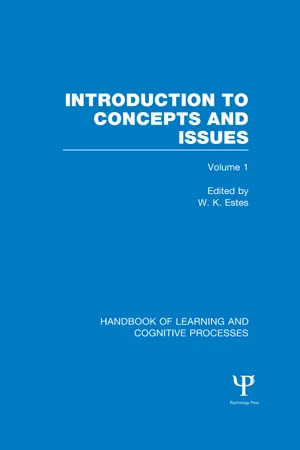Psychology
Comparison of Approaches Psychology
The comparison of approaches in psychology involves evaluating different theoretical perspectives and methodologies used to understand human behavior and mental processes. Key approaches include behaviorism, psychoanalysis, cognitive psychology, humanistic psychology, and biological psychology. Each approach offers unique insights into the complexities of the human mind and behavior, contributing to a comprehensive understanding of psychological phenomena.
Written by Perlego with AI-assistance
Related key terms
6 Key excerpts on "Comparison of Approaches Psychology"
- eBook - ePub
Handbook of Learning and Cognitive Processes (Volume 1)
Introduction to Concepts and Issues
- W. K. Estes, W. K. Estes(Authors)
- 2014(Publication Date)
- Psychology Press(Publisher)
4
Douglas Medin Michael Cole Rockefeller UniversityComparative Psychology and Human CognitionOne of the strange aspects of writing an article advocating comparative research on human cognition in the latter quarter of the twentieth century is that the idea is at least a century old. Darwin’s famous study of the expression of emotions in man was but one of many essays in comparative psychology in the last century. In the current century there have been several attempts to incorporate comparative research into the main body of psychological theory (Werner, 1948).Generally, however, these attempts were not particularly influential, mainly, in our opinion, because neither cognitive theories nor comparative research strategies had evolved to the point where there was a strong basis for positive interaction between the two.In this presentation we would like to consider the theoretical and practical advantages to be gained from the inclusion of a wide range of subject populations and behaviors in a general psychology of human cognition. Our goal is to provide a framework for evaluating and integrating data gathered from diverse subject populations. We hope to demonstrate that this framework can be useful to the comparative researcher interested in the basis of group differences and can be relevant to understanding cognitive processes independent of any special interest in comparative enterprises. The domain of comparative research in this article is intended to include at least phylogenetic, developmental, and cross-cultural comparisons because we believe that there is a logic to the comparative approach that is basically similar, regardless of whether we are looking at comparisons across cultures, across species, or across ages within a species. Further, we maintain that studies of special groups, whether they are particular species, ages, or cultural groups, can be more enlightening if the research is appropriately guided by theoretical considerations. - eBook - ePub
Education and Psychology in Interaction
Working With Uncertainty in Interconnected Fields
- Brahm Norwich(Author)
- 2002(Publication Date)
- Routledge(Publisher)
There are different accounts of types of psychology. They vary depending on whether they come from textbooks, which tend to provide overviews for students on courses, or from proponents of particular strands or schools of thought. One view which was current in the middle of this century was that there were three broad positions: the behaviourist, the psychodynamic and the humanist. The behaviourist position represented the mechanistic scientific approach, which regulated its study by the disciplines of experimental and systematic empirical methodologies. The psychodynamic represented that family of approaches which assumed the central place of unconscious motivation and processes in human behaviour. The humanistic represented a family of approaches which assumed the active self-determining and interpretive nature of human behaviour. Over the last 20 years, since what has been called the ‘cognitive revolution’ (Bruner, 1997), information-processing assumptions have become dominant over classic behaviourist ones. However, some theorists would see a continuity between behavioural and cognitive principles and a unity in the adoption of experimental and empirical methodologies (Bandura, 1977).A key difference between the psychodynamic and humanistic traditions was in their attitude to conscious human agency. The original psychoanalytic theories associated with Freud recognised the determining role of instinctual and unconscious processes, whereas humanistic theories, such as those of Carl Rogers and George Kelly, stressed the active, conscious and reflective aspects of functioning. However, it is possible to see continuities between instinctually based psychodynamic and humanistic psychologies. This is evident in the reaction to Freudian ideas by post-Freudian theorists (e.g. Fromm, 1956) and more recent ego-oriented theorists (e.g. Kohut, 1978). It is also possible to see some versions of personal construct psychology integrated with analytic ideas and assumptions (Ryle, 1990). That there is no clear distinction between dynamic and humanistic psychologies can also be understood in terms of their shared origin in the practice of psychotherapy and counselling. What theoretical differences there are could be attributed to professional and institutional differences. Psychodynamic ideas of a psychoanalytic orientation were strongly regulated by the original psychoanalytic movement. Theorists who propounded variations were excluded, with the result that rival factions and traditions emerged. The original psychoanalytic ideas also derived from Europe and were more in tune with conservative values. Their adoption in the US increased stress on ego orientation and the emergence of humanistic traditions. The growth of counselling as a form of psychotherapy and as an alternative to the analytic version also led to the development of more humanistic theories. Counselling had a base which extended outside the treatment of people with serious mental health and illness problems. The emphasis was more on promoting personal development and well-being. - eBook - ePub
Psychology in Historical Context
Theories and Debates
- Richard Gross(Author)
- 2017(Publication Date)
- Routledge(Publisher)
Chapter 1 Historical perspectives Psychology as the study of … what?If there’s a logical place to start one’s study of Psychology, it’s by looking at how it came to be where it is now; in other words, its history. But as we shall see below, this isn’t as straightforward as it may sound: there are different ways of ‘doing history’ and different resultant histories. Put another way, there’s more than one history of Psychology.Some may disagree with the premise that we should start with Psychology’s past, claiming instead that the logical starting point is to decide what Psychology is about, its subject-matter. But again, this too is a matter of debate and disagreement. In terms of one of its histories, Psychology’s subject matter (its ontology) is defined differently by different schools of thought or theoretical approaches, which have developed over time (roughly, the past 140 years, albeit with considerable overlap between them). Part of this debate relates to similarities and differences between human beings and non-human animals; sometimes this is addressed directly, sometimes it’s ignored altogether.These approaches (such as Structuralism, Behaviourism, and Cognitive Psychology) differ not only in terms of what they consider the appropriate subject-matter to be, but also in terms of the methods used (or advocated) for studying this subject-matter. This relates to the debate regarding the nature of science (in general) and the validity and appropriateness of using certain methods to investigate human beings/people (in particular).The implication of the preceding paragraphs is that, regardless of how we view Psychology’s history, and regardless of how its subject-matter is defined, Psychology adopts a scientific approach. This, in turn, begs two major questions: (1) What do we mean by science? And (2) what kind of science is/should Psychology be? These questions relate to epistemology and methodology - eBook - ePub
Comparative and Cross-Cultural Health Research
A Practical Guide
- Roy Lilley, Bill Cain(Authors)
- 2018(Publication Date)
- CRC Press(Publisher)
In this chapter we consider some of the different purposes and assumptions of comparative health research. We start by describing six different types: the descriptive, explanatory, experimental, phenomenological, genotypical and phenotypical. We then consider some of the philosophical assumptions underlying these different approaches and how studies conceptualise their object of investigation. The last part of the chapter shows a way to represent in a diagram the design used in a study. It shows how to represent the whole objects that are compared, the characteristic of those objects and the context ‘surrounding’ the whole object. It discusses the philosophical issues raised by this method of summarising a study.Comparison is a powerful method for undertaking the two tasks of research – to describe and explain. Comparative research usually aims to:- observe and describe (e.g. does the item exist in different places? What are the similarities and differences?)
- describe an association (e.g. is the presence or absence of an event or factor associated with the presence or absence of another event or factor in one place, and in different places?)
- establish causal mechanisms or influences (e.g. by making comparisons we can isolate possible influences and establish the evidence for and against one thing causing or influencing another)
- explain human action and perceptions in terms of both the meaning to the actors and the context (e.g. to explain, using comparisons, why people act differently in similar circumstances, or vice versa, or why a policy ‘fails’ in one place and ‘succeeds’ in another).
Research approaches
We can describe a comparative health research study in terms of its purpose and research approach, characterised below as: descriptive, explanatory, experimental, phenomenological, genotypical and phenotypical. These are not mutually exclusive – a phenomenological approach may aim to both describe and explain. - eBook - ePub
- (Author)
- 2012(Publication Date)
- Wiley(Publisher)
Underlying the research effort have been issues of methodology. The field has been characterized by eclecticism, as most researchers have used whatever methods have appeared appropriate for the problem under study. Although some comparative psychologists, such as Carpenter, Schneirla, Yerkes, Mason, and others, have conducted field research, most have preferred the controlled conditions of the laboratory. Not all comparative psychologists make overt comparisons among species; the goal is not one of comparison for the sake of comparison, but rather the development of principles of generality. Although some, such as Kline, Schneirla, and James V. McConnell, have studied invertebrates, most have concentrated on vertebrates, especially mammals. Some, such as Beach, Lehrman, and Carpenter, have concentrated on naturally occurring behavioral patterns; others have turned their attention to the study of learning and motivation in a comparative context. Although experimentation is the preferred method, many observational and correlational studies have been important. The anecdotes that characterized early research generally disappeared as laboratory methodology became more sophisticated but have begun to creep back into the field, as some astute observers believe that the most remarkable feats of animals cannot be produced under controlled conditions but require unusual circumstances. Comparative psychologists have devoted much attention to the construction of apparatuses appropriate to the problem at hand (Warden et al., 1935; D. A. Washburn, Rumbaugh, & Richardson, 1998).The theory of evolution has provided the conceptual foundation of psychology since its founding. At times, it has been in the foreground, as in the early work of James, Angell, Hall, and James Mark Baldwin (1896), who along with two others, proposed the “Baldwin effect” as a means to explain apparent inheritance of acquired traits with more conventional evolutionary principles. Another example is the APA presidential address of Calvin Stone (1943). At other times, it has been more implicit. Although the evolutionary focus of comparative psychology was not obvious to some observers during parts of the history of the field, the strong evolutionary approach has been increasingly visible since World War II.Surely, the most persistent issue in comparative psychology, and perhaps for all psychology, has been the nature–nurture problem. Throughout its history the pendulum has swung back and forth between emphases on genes and environment in the development of behavior. Such psychologists as William James and William McDougall postulated many instincts in humans and other species. This led to an anti-instinct revolt that was particularly strong during the 1920s. Most comparative psychologists now recognize the importance of the continuous, dynamic interaction of genes and environment in the development of behavior. Some, such as Yerkes, Stone, Robert Tryon, and Jerry Hirsch, have conducted important studies of genetic influences. Such psychologists as Harlow, Eckhard Hess, and Gilbert Gottlieb have worked more on experiential factors. Virtually all agree on the importance of the dynamic interaction of both. - Dominic Upton(Author)
- 2013(Publication Date)
- Routledge(Publisher)
The cognitive approach grew out of discontent with the behaviourist model and its focus on environmental factors; the irony is that cognitive psychology today is rather similar to behaviourism in that it excludes certain other internal factors such as motivation and emotion (Eysenck and Flanagan, 2007; Eysenck and Keane, 2010). For this reason the cognitive approach has been described as overly reductionist and deterministic. It has also been described as mechanistic because cognitive explanations themselves are based on the ‘behaviour’ of machines.Much of the research in cognitive psychology is experimental and conducted in laboratories. Some would argue that laboratory experiments create an artificial environment and that subsequent results have low ecological validity. Nevertheless, there are many successful ‘real world’ applications of cognitive psychology relevant to nursing and health practice, ranging from suggestions about how to improve communication and information giving, to how theories of perception promote holistic care (see Chapter 5 ).Strengths and weaknesses of the cognitive approachStrengthsScientific. Large number of successful applications. Focuses on processes unique to human beings (i.e. thought). Combines easily with approaches, e.g. cognitive behavioural therapy. Many empirical studies to support theories. WeaknessesMechanistic. Lacks human element, i.e. ignores social factors and the role of emotion. Research on which cognitive explanations are based is rather artificial. Ignores biology (e.g. hormones). 2.18 Humanistic psychologyHumanistic psychology emerged in the 1950s as a reaction to the dominant paradigms in psychology – namely the behaviourist and psychodynamic approaches. Thus it was said to be the ‘third force’ in psychology by one of its founding members, Abraham Maslow (1970). Humanist psychologists considered psychoanalysis to be too pessimistic due to its emphasis on pathological, irrational and unconscious fragmentation aspects of personality. Additionally, behaviourism was rejected due to its mechanistic underpinnings and approach to understanding the human condition.The humanistic approach strives to provide a more holistic vision of both psychology and the person. It has roots in existentialist thought which holds that human beings have free will and freedom of choice (personal agency is the humanistic term for exercising free will). It is further assumed that people are basically good in nature and have an innate need to grow, develop and achieve their full potential; this has been captured by the term self-actualisation
Learn about this page
Index pages curate the most relevant extracts from our library of academic textbooks. They’ve been created using an in-house natural language model (NLM), each adding context and meaning to key research topics.





